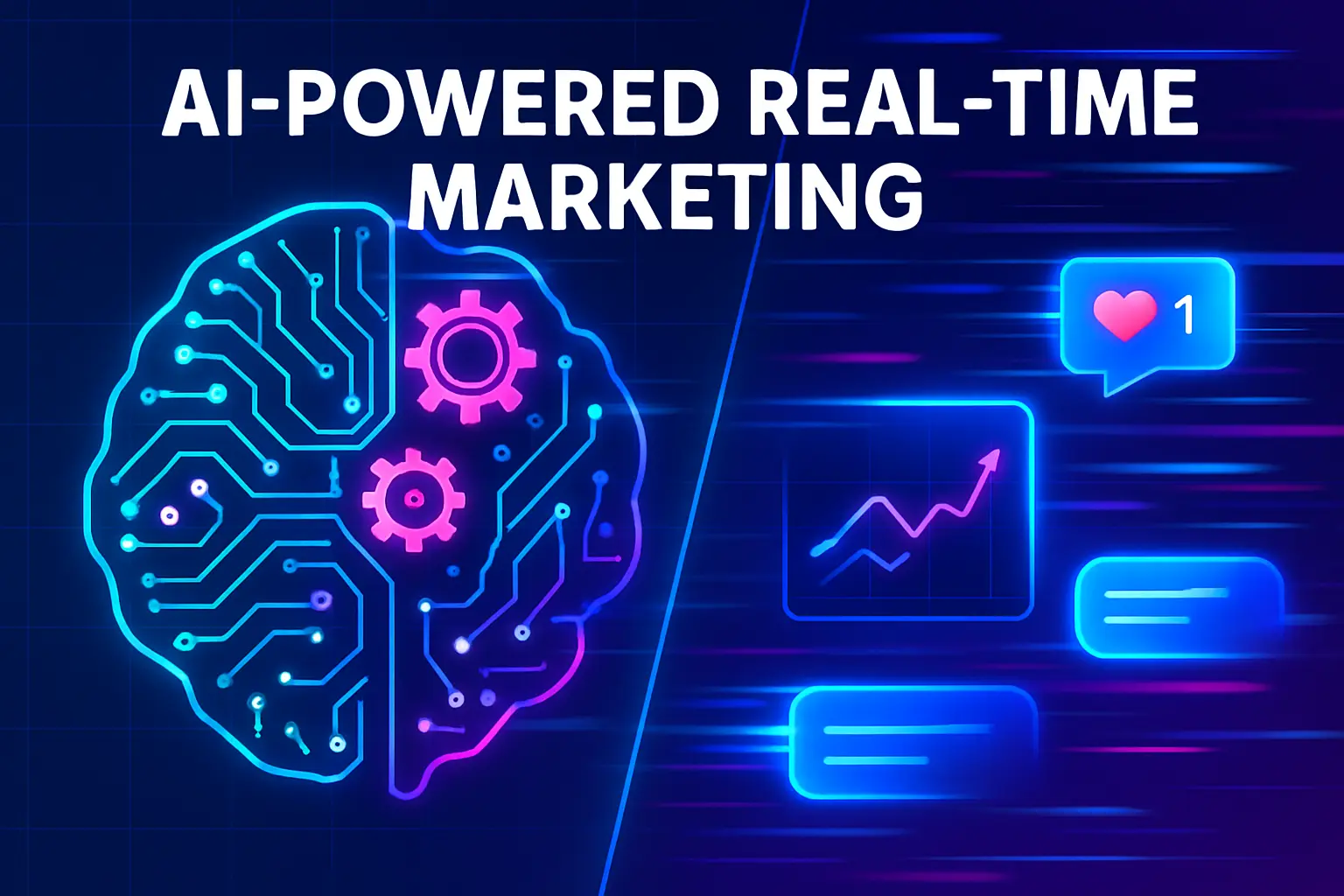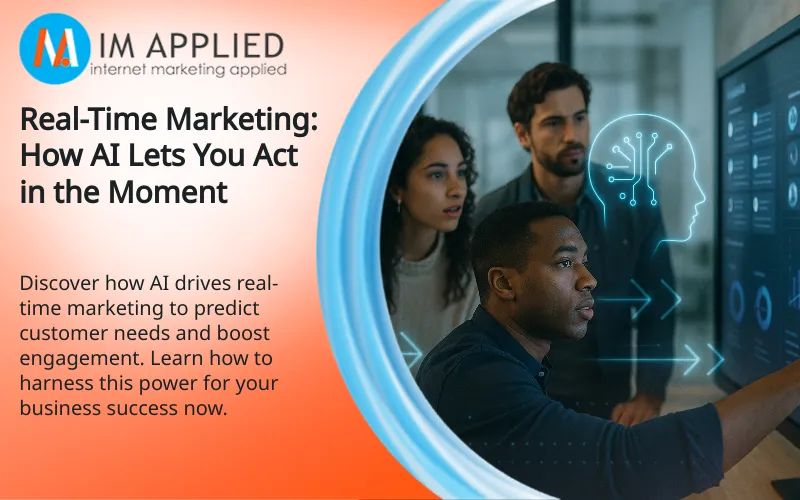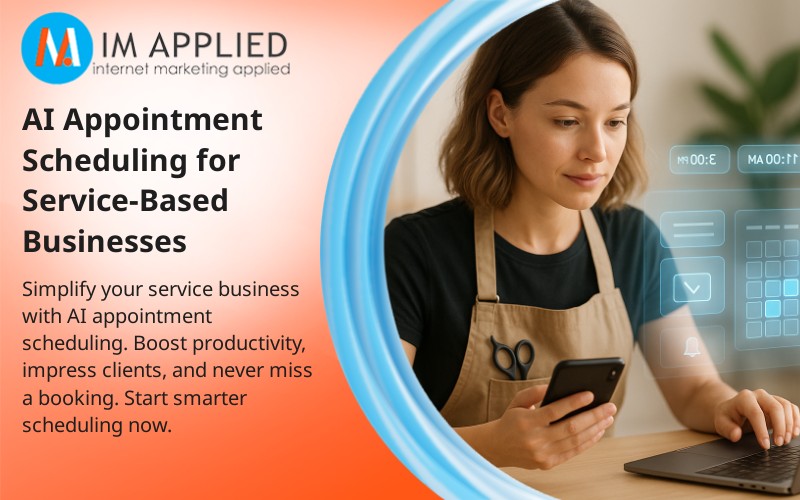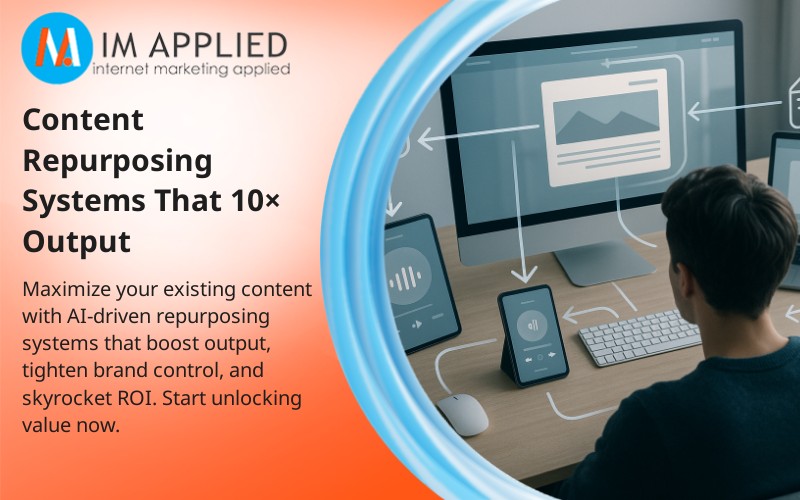Real-Time Marketing: How AI Lets You Act in the Moment
Karl Marais | 21 July 2025
Ever wonder how Spotify seems to know exactly what song you’ll want next, or how Netflix’s recommendations feel spot-on?
The magic behind these experiences lies in real-time marketing powered by AI, and its potential is far greater than dynamic playlists or movie picks.
Real-time marketing with AI is changing the way businesses interact with customers, and this transformation is progressing rapidly.
Understanding Real-Time Marketing
Thanks to digital innovation, brands can engage audiences instantly.
Real-time marketing involves responding promptly to customer actions or unfolding events with highly relevant content or offers.
Its hallmark is personalization and immediacy, designed to boost consumer engagement in the moment.
AI marketing optimizes this process, making real-time responses scalable even at high volumes.
AI-driven marketing tools process vast datasets in seconds, uncovering insights that are impossible for humans alone.
They enable audience segmentation, anticipate behaviors, and personalize every interaction.
This shift brings a new era in data-driven marketing.
Combining automation, speed, and predictive analytics to meet consumer needs, often before those needs are explicitly known.
Automation now means crafting messages that are both timely and precise, turning fleeting opportunities into meaningful, profit-driving engagements.
What is Real-Time Marketing?
Real-time marketing moves from reaction to anticipation.
Brands using this approach tailor their messaging to a customer’s current context, creating relevance and resonance.
Quick-witted tweets about live events, timely social media campaigns, or flash discounts during major happenings exemplify real-time marketing.
Crucially, this isn’t just about speed.
Brands must understand their audience’s attitudes and needs in the moment, ensuring all campaigns connect authentically.
A dynamic strategy like this replaces the old static marketing calendar with agile, audience-centric execution.
The Role of AI in Real-Time Marketing
In this context, AI operates as the engine behind instantaneous decisions.
With advanced algorithms, AI pinpoints which content will appeal to which customer, and when.
This enables predictive outreach, allowing brands to meet needs as they emerge.
AI both increases efficiency and elevates relevance. Marketers, freed from repetitive tasks, can now spend more time focusing on creativity and strategy.
AI’s sophistication makes real-time marketing genuinely adaptive, accurate, and far-reaching.
The Benefits of Real-Time Marketing with AI
Businesses that employ AI for real-time marketing see substantial improvements, including increased conversions, enhanced customer experiences, and greater cost efficiency.
AI optimizes strategies, ensuring the right message reaches the right audience at the optimal time, thereby maximizing ROI and minimizing wasted effort.
This precision fosters higher brand loyalty.
An AI-driven strategy creates personalized, memorable customer journeys, keeping brands competitive in a rapidly shifting marketplace.
Acting on Data Insights Immediately
The core strength of AI marketing lies in processing real-time data at speed.
AI platforms interpret vast data arrays, deriving immediate insights that drive data-driven decisions.
Predictive analytics help forecast trends and behaviors, giving businesses the agility to act on new opportunities or solve issues faster than competitors.
With this framework, companies can tailor their messaging on the fly, keeping strategies aligned with consumer needs as they evolve, turning informed precision into a sustained competitive advantage.
Enhanced User Experience and Engagement
AI enables true personalized experiences, providing content and offers tailored to each customer’s preferences and timing.
This boosts satisfaction and encourages deeper brand loyalty.
Data-driven adjustments refine engagement channels, ensuring every interaction is relevant and valued.
Economic Impact and Cost Efficiency
Cost efficiency is another hallmark.
AI allocates resources optimally, reducing waste and maximizing return.
Automation lowers errors and streamlines processes, increasing revenue without inflating budgets.
Brands embracing these efficiencies secure a solid, sustainable foundation for ongoing success.
How AI Facilitates Real-Time Marketing

AI marketing tools reshape real-time engagement by rapidly analyzing data and customizing experiences.
Machine learning and natural language processing can be combined to decode user intent, enabling instantaneous action on emerging trends.
AI-driven analysis turns raw data into actionable insights, making interactions proactive, not just reactive.
Mastering how AI works in real-time marketing sharpens strategy and enhances engagement.
Machine Learning and Predictive Analytics
With machine learning, brands identify trends and anticipate customer desires.
AI detects patterns in massive data sets and predicts future behavior, allowing companies to adjust campaigns well ahead of need.
This provides your business with strategic foresight, rather than relying on guesswork.
AI-Driven Content Creation
AI content tools generate vast volumes of personalized content quickly.
Tailored messages increase engagement and reduce manual workload, making the content strategy more dynamic and responsive.
Real-Time Customer Activity Tracking
Tracking customer activity across platforms yields real-time insights.
Analytics provide a detailed view of user behavior, enabling rapid and effective adjustments to marketing strategies and reinforcing loyalty.
Automated Multichannel Message Delivery
Marketing automation ensures consistent messaging across channels.
Automated, personalized communications reach consumers at the right time and place, boosting both efficiency and impact.
Strategies for Implementing Real-Time Marketing
To adopt real-time AI marketing, integrate AI tools with existing systems. Identify your most valuable data points and set up seamless information flows.
Robust CRM and content management systems (CMS) are essential for capturing interactions and delivering timely messages.
Stay agile by analyzing trends and continuously refining your approach. Invest in data analytics skills to anticipate market shifts rather than react to them.
Explore resources like this SEO website structure guide to strengthen your framework.
Essential Capabilities Needed
Success requires the right technologies, including real-time analytics, marketing automation, an efficient CMS, and a strong CRM.
Advanced data analytics uncovers opportunities; automation delivers timely messages, and optimized systems ensure swift, relevant outreach.
Starting Small and Scaling Gradually
Pilot projects let you test strategies with low risk, allowing room for refinement.
Use real-time analytics to monitor outcomes, iteratively scaling as you gather evidence of success.
Methodical A/B testing and optimization enable you to test multiple approaches simultaneously, allowing you to find the optimal direction with minimal costs.
Monitoring Real-Time Analytics
Real-time dashboards track KPIs and visualize performance, enabling swift, data-driven adjustments.
Immediate feedback allows campaigns to be fine-tuned while they are running, ensuring ongoing effectiveness.
Adapting Strategies Based on Insights
Embrace agile principles: Utilize analytics and performance reviews to evolve campaigns continually.
Regular optimization, fueled by real-time data, ensures your marketing remains both strategic and compelling.
Overcoming Challenges in Real-Time Marketing

Despite its promise, real-time marketing brings challenges. Data quality and integration can be weak points; ensure data is cleansed and standardized.
Invest in security, encryption, and ethical data practices to safeguard user privacy.
Focus on addressing AI bias and prioritize algorithmic transparency to maintain trust.
Navigating these hurdles is crucial to realizing the full value of real-time marketing.
The Future of Real-Time Marketing with AI
AI-driven marketing is ushering in hyper-personalized and immersive experiences.
Predictive analytics now anticipate customer needs, while technologies like conversational AI transform the way customers engage.
Staying ahead means watching these trends and preparing teams for rapid change.
Upskilling becomes crucial, and AI literacy and digital fluency are critical for future-ready marketing.
Companies that proactively adapt are best positioned to lead as technology continues to evolve.
Conclusion
AI is rapidly reshaping how brands connect with customers, delivering instant, personalized interactions at scale.
Key advantages include more intelligent targeting, improved ROI, and scalable engagement.
However, staying ethical and current with technology is as vital as personalization.
Success requires continuous learning and adaptation, blending AI’s capabilities with human creativity.
The path forward lies in leveraging technology alongside the human touch for truly impactful marketing.
For more information on optimizing content strategies, refer to this guide.
The future of marketing will belong to those who integrate AI with empathy, trust, and agile strategy, achieving not just efficiency, but also authentic, long-lasting customer relationships.




